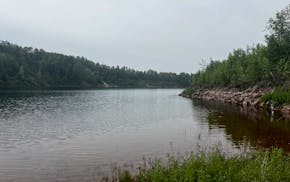Last month's massive spill of water contaminated with coal ash in northern Minnesota is being watched closely for potential harm to wild-rice beds, which grow in a nearby creek and lake, officials say.
Testing has shown the spilled water contains sulfates, a known threat to wild rice, according to Duluth-based utility Minnesota Power and the Minnesota Pollution Control Agency. The state has a limit on sulfates in rice-producing water because the mineral salts dissolve and damage rice plants over the long term.
The spill was discovered July 16 at Minnesota Power's Boswell Energy Center in Cohasset, Minn. Sulfates have shown up in highest amounts, about 20 times the state limit, right where the spill reached Blackwater Creek, according to Kurt Anderson, director of environmental and land management for Minnesota Power.
Blackwater Creek, a slow-moving waterway covered with water lilies and scattered rice stands, empties into Blackwater Lake, an impoundment of the Mississippi River. Sampling in the lake has mostly shown lower sulfate levels, Anderson said.
Brandy Toft, environmental director for the nearby Leech Lake Band of Ojibwe, said Blackwater Lake's rice bed is a sought-after location for tribal members and Minnesotans alike. Aside from providing what's a sacred food for tribes in Minnesota, the area also has high biological diversity, raising concerns about the spill's effects on the ecosystem.
The utility has excavated 1,000 tons of tainted dirt from the spill site, which originated in a broken underground pipe, Anderson said. It has also installed a boom in the creek to stop more contaminated water from reaching the lake.
There are no signs yet the chemicals have stressed the plants, according to MPCA and Minnesota Power. But it could take a long time for any damage to show up. Wild rice grows in yearslong "boom-bust" cycles, and state regulators require as much as a decade of data to determine how well a polluted rice bed may be doing.
In all, Minnesota Power estimates it spilled 5.5 million gallons of the polluted water, which was being siphoned off the top of a pond where coal ash was deposited for many decades. On Tuesday, Anderson said the broken underground pipe where the leak originated may have leaked for as long as five days.
Minnesota Power noticed a loss of pressure in the pipe five days before the leak bubbled to the surface; the same day it was discovered, he said, divers were examining the underwater intake of the pipe to see if anything was blocking it.
"We immediately reported the spill, once we knew we had a spill," Anderson said.
State officials have said they've also found chlorides, or salts, during water testing, as well as boron, an element that occurs in trace amounts in many foods. Minnesota limits boron in water because it can harm irrigated crops.
Anderson said boron levels have not reached the point of concern, and are mostly being tracked to help determine how far the tainted water spread.
Anderson: He paddled solo into the BWCA and didn't come back

Accomplished climber, photographer who recently moved from St. Paul missing on mountain
dj](https://arc.stimg.co/startribunemedia/34QSKO44B2XKVNUZCO5SLJQSLY.jpg?h=91&w=145&fit=crop&bg=999&crop=faces)
Some adults will soon need a permit to operate a boat or personal watercraft in Minnesota

